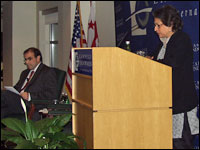Registration
You will receive an email confirming your registration.
IMGXYZ549IMGZYXOn October 31, 2006, the Carnegie Endowment for International Peace hosted Ms. Asma Jehangir, Chairperson of the Human Rights Commission of Pakistan. Speaking on “Pakistan in Transition,” Ms. Jehangir presented her views on the political climate in the country.
Painting a rather pessimistic picture, Ms. Jehangir expressed the desire to point out two widely prevailing myths about Pakistan and General Musharraf, President of Pakistan, in particular. The first myth, she argued, is that President Musharraf is actually popular among the people of Pakistan. Pointing to evidence to the contrary, Ms. Jehangir advised that the sooner policymakers in the United States realize that thrusting an unpopular dictator on people in Pakistan will simply keep increasing resentment against the U.S., the better it will be.
The second myth is that President Musharraf is good for U.S. interests. Dispelling any such assessment, she strongly refuted the “moderate enlightenment” tag currently being associated with President Musharraf’s regime. She described various occasions where there was clear evidence of official meddling, nepotism, discrimination, corruption and other human rights violations, including a violation of her own dignity during a recent marathon event that she had participated in.
Talking about the phenomenon of disappearances, she claimed that five kinds of people have mysteriously disappeared in recent years. Prominent among them are Baluchi nationalists, who have been picked up not as part of the war on terror but to suppress the Baluchi resistance to the exploitation of their natural resources including oil and gas, citing the killing of Nawab Akbar Bugti as an example. Baluchi nationalism, she cautioned, is by no means dead. Other groups that have suffered in this regard include religious minorities like Hindus in Sindh on alleged charges of espionage, and journalists.
Condemning terrorism in any part of the world unequivocally, Ms. Jehangir blamed the Army-ISI nexus for providing protection and encouragement to religious militants and claimed that militancy would continue to rise as long as the army stays in power in Pakistan. Madrasas and mosques, she argued, had become centers of political activity and recruitment.
On the issue of the 2007 elections, Ms. Jehangir said that there were no signs that they would be free and fair. She predicted protests in Sindh and Baluchistan, among other places if the 2007 elections were a sham, suggesting it was time the U.S. realized that dictators were not serving any purpose. She listed several steps to improve the political situation in Pakistan including1) an autonomous Election Commission constituted through an all-party consensus; 2) better selection mechanism for judiciary in superior courts, along the lines of the recommendations of the International Commission of Jurists; 3) a stronger accountability system; 4) a workable and effective Parliament, with powers of budget oversight, especially the Defence budget, and greater transparency; 5) complete civilian control of Pakistan’s nuclear command system; 6) no impunity for militancy, especially religious militancy; and 7) a consensus on foreign policy among all political parties towards two countries- India and Afghanistan- to prevent unnecessary accusations of betrayal by the opposition.
In the Q&A session, Ms. Jehangir pointed out that the military dictatorship has substantial economic interests, and is engaged in land-grabbing, writing off bank loans for supporters, corruption, profitable business ventures (including chicken farms). As a result, the retired military officials have larger assets than even private sector executives. Emphasizing the building of institutions, she argued that while she was not a fan of Benazir Bhutto or Nawaz Sharif, a democratic system and its institutions have clear advantages- “the collateral benefits of democracy.” Change and regime-change was possible in a democracy, but not in a dictatorship. Moreover, the perceived incompetence of alternative political leadership was no reason against democracy in any country, let alone Pakistan. Talking about the state of civil society, she mentioned the Supreme Court Bar Association and the Press Club, and hoped that these two CSOs would re-emerge as more powerful organizations.
She also touched upon the issues of the Hadood Ordinance laws, the environment for grooming young politicians, management of donations for earthquake relief, and the U.N. Human rights Council. She stressed the need for reforming the education system in Pakistan which had simply become a breeding ground for militancy and hatred towards non-believers or infidels. Admitting that the Musharraf government could legitimately take credit for the economic revival of Pakistan, she refused to give kudos to President Musharraf for the freedom of the press, citing the valiant struggle of veteran Pakistani journalists over the years and the rise of the internet as the real reasons why the media has acquired greater freedom.
This summary was prepared by Anirudh Suri, Junior Fellow with the South Asia Program at the Carnegie Endowment.
